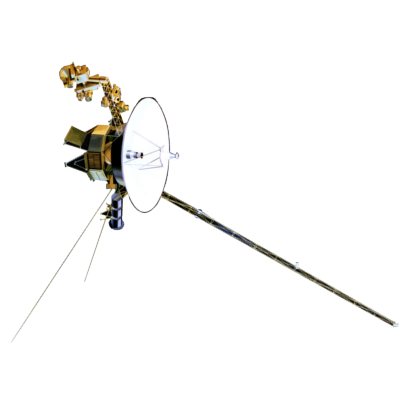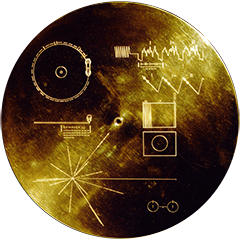Voyager LECP Data Analysis Handbook
Data File Descriptions
Experiment Data Record (EDR) Format Specification
Cruise 4
(From Document 618-306, Revision D)
The LECP EDR science physical record corresponds to a 192-second measurement period. Any data not present within a given physical record is filled with zeroes.
A major LECP measurement cycle is 12 minutes. Hence, there are 15 physical records or 4 LECP major cycles per 48 minutes period.
The physical science record structure is shown in Figure 7.3-1.
Figure 7.3-1. LECP Physical Science Tape Records
| Standard Header (60 Words) |
Subheader (8 Words) |
Data Block (320 Words) |
40 MF 192 Sec 388 Words |
All Words 32-bits.
One physical record contains a standard EDR header followed by a science subheader followed by a science data block. One physical record contains all the data from 40 telemetry frames relevant to the experiment. Total record length is 388 words (40 MF; 192 sec).
Figure 7.3-4 and Table 7.3-1 define the structure and contents of the LECP science record subheader.
Figure 7.3-4. LECP Science Subheader Format (CR-4)
|
EDR |
Bits 31 15 0 |
31 0 | |
| 1 | LECP CMD MF 2 |
LECP CMD |
Spare |
| 3 | Spare | Spare | |
| 5 | Spare | Spare | |
| 7 | Spare | Spare | |
Total block length is 8 EDR (32-bit) words (40 MF; 2 CMD Word).
MF 1-10 = MF 1-10 when SCT60 is even (n).
MF 11-20 = MF 1-10 when SCT60 is off (n+1).
MF 21-30 = MF 1-10 when SCT60 is even (n+2).
MF 31-40 = MF 1-10 when SCT60 is off (n+3).
(n = 0, 4, 8, ..., 56)
Command Word Format:
| 15 0 | ||||||||||||||||
Table 7.3-1. LECP EDR Science Subheader Block Table (CR-4)
| Item | Word | Bits |
Description |
| 1 | 1 | 31-16 | LECP Command Word MF2 |
| 2 | 1 | 15-0 | LECP Command Word MF22 |
| 3 | 2 | 31-0 | Spare |
| 4 | 3 | 31-0 | Spare |
| 5 | 4 | 31-0 | Spare |
| 6 | 5 | 31-0 | Spare |
| 7 | 6 | 31-0 | Spare |
| 8 | 7 | 31-0 | Spare |
| 9 | 8 | 31-0 | Spare |
Figure 7.3-5 and Table 7.3-2 define the structure and contents of the LECP science logical records.
Figure 7.3-5. LECP EDR Science Logical Record Format (CR-4)
| N | EDR Word |
Bits |
|||
| 31 | 15 0 | 31 | 15 0 | ||
| 1 | 1 | P1* | P1 | P1 | P1 |
| 3 | R1 | R1 | R1 | R1 | |
| 5 | P2 | P2 | P2 | P2 | |
| 7 | P3 | P3 | P3 | P3 | |
| 2 | 9 | R2 | R2 | R2 | R2 |
| 11 | P4 | P4 | P4 | P4 | |
| 13 | P5 | P5 | P5 | P5 | |
| 15 | R3 | R3 | R3 | R3 | |
| 3 | 17 | P6 | P6 | P6 | P6 |
| 19 | P7 | P7 | P7 | P7 | |
| 21 | R4 | R4 | R4 | R4 | |
| 23 | P8 | P8 | P8 | P8 | |
P = PHA; R = Rate/Status
Both P and R 40-bit blocks are treated as four 10-bit data
words.
This logical record length is 24 EDR (32-bit) words (3 MF; 48 PHA/Rate words). A logical record consists of 3 segments which may span physical records.
PHA and Rate/Status Format:
| 15 9 0 | ||||||||||||||||
|
Zero |
||||||||||||||||
Logical records are packed into the science data blocks of physical records according to Figure 7.3-3. The standard EDR header is defined for CR-4 in Appendix C.
Summary
The telemetry and EDR parameters for each experiment are summarized in Figure 7.10-1. The telemetry parameters include:
A. Experiment bit fields
B. Data word bit lengths
C. Data words per MF
D. Instrument cycles
The EDR parameters for subheader and data block include:
A. Minor frames
B. Time period
C. Experiment data words
D. EDR (32-bit words)
Next: Cruise 5
Return to EDR main page.
Return to Data File Descriptions main page.
Return to Voyager
LECP Data Analysis Handbook Table of Contents.
Return to Fundamental
Technologies Home Page.
Updated 8/9/19, Cameron Crane
VOYAGER 1 ELAPSED TIME
*Since official launch
September 5, 1977, 12:56:00:00 UTC
VOYAGER 2 ELAPSED TIME
*Since official launch
August 20, 1977, 14:29:00:00 UTC
QUICK FACTS
Mission Duration: 40+ years have elapsed for both Voyager 1 and Voyager 2 (both are ongoing).
Destination: Their original destinations were Saturn and Jupiter. Their current destination is interstellar space.



